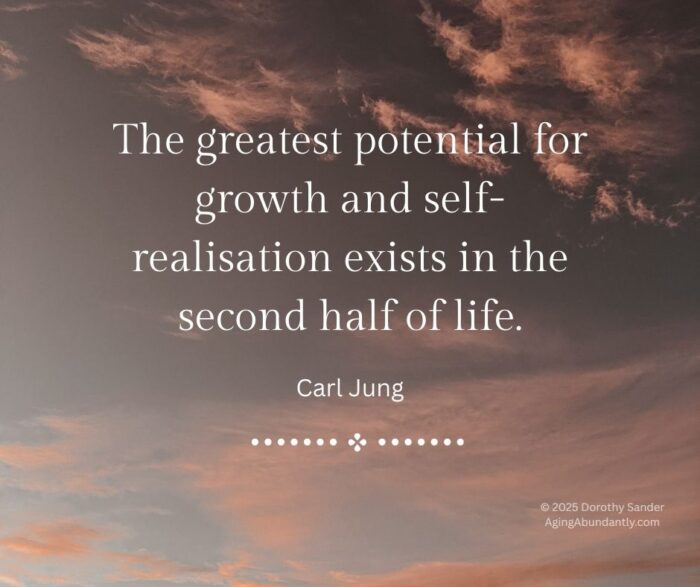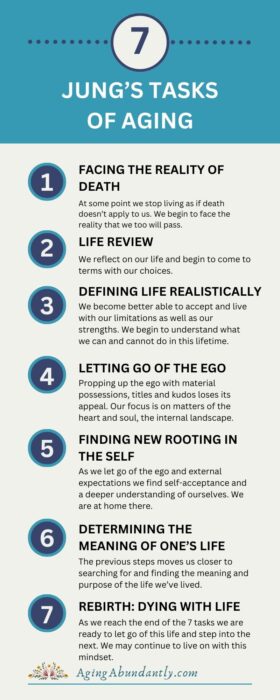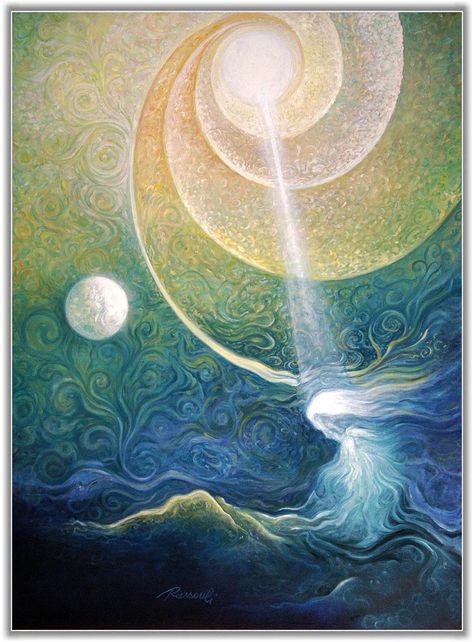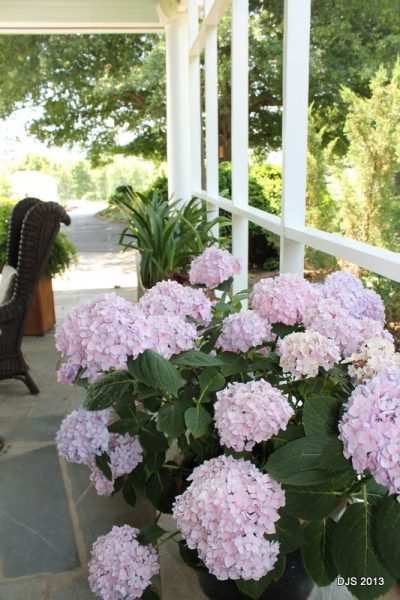Jung’s 7 Tasks of Aging: Task One — Facing the Reality of Aging and Dying
Editor’s Note: Originally published April 30, 2015; updated August 2025 with new insights and resources.
Carl Jung viewed later life as a developmental stage, not a slow countdown. Through work with patients—and his own aging—he saw a natural turning from outer achievement to the inner work of unifying the opposites, a movement toward individuation and the gradual spiritualization of consciousness. In other words, we grow less concerned with externals and more attuned to what is happening within us—what we value, believe, and know to be true.
Jung described this path as seven tasks of aging. The first most of us meet is facing reality.
Task One:
Facing the reality of aging & dying
Aging gives us endless opportunities to wake up to reality. Bodies change, energy ebbs and flows, time leaves its fingerprints everywhere. We may feel shocked by the realization that youth is not forever and that death is, in fact, on our future “to-do” list. When we are young we seldom think of these things; we’re absorbed in building a life. Over time, our psychological awareness evolves and nudges us toward growth and a more spacious consciousness.
We also collide with a culture that worships youth and sidelines the old. Even as that improves, the message is still loud: avoid and postpone aging. Without noticing, we can pour energy into holding on—staying young, busy, and endlessly productive—rather than embracing the inner tasks of this season. Something often feels “off” when we do this. Deep down we know we are skirting reality.

Growing older as opportunity
Aging is an invitation to go deep—to resolve painful chapters, clarify what we value, and soften into a wiser, more accepting stance toward life’s ebb and flow, its living and its dying. This is demanding work, yes, but pushing it away is harder in the long run—more taxing and less rewarding.
How to begin facing reality
It’s one thing to name the task; it’s another to do it. In my experience, facing aging asks for courage: to loosen defenses, set aside our assumptions, and allow honest questions to surface. These simple practices help us turn toward the work:
Quiet. Seek moments of true quiet. Turn down the outer noise and the inner chatter. Sit and listen.
Deep breathing. Breath is life. Attend to it. Slow and deepen your breathing; feel the body expand and the mind settle. Let thoughts and feelings surface; notice them and let them pass.
Journal writing. Write what arises. Name unresolved issues. Follow feelings where they lead. Writing engages the rational mind so understanding and perspective can form.
Return to nature. Step away from the man-made toward the living world. Walk without headphones. Let your senses lead.
Meditation. Explore a practice that fits you—on your own or with a class. (Jon Kabat-Zinn’s Full Catastrophe Living is a clear, time-tested guide.)
These rhythms help us face aging—and, ultimately, death—with steadiness. They support us as we meet fear and loosen obstacles to awareness and acceptance.
Further reading: I maintain a growing list of books that support this season of life. Full Catastrophe Living remains one of my favorites for grounding meditation in everyday practice.
If this piece helped, you may also enjoy The Wisdom Within—a companion for the midlife journey. Available on Amazon or here, for a signed copy.





12 Comments
Joan Z. Rough
Dorothy, I have spent years doing all of those things on and off, but it is now in these later years that those tools are what I turn to every day. Allowing myself to banish the type A personality of my early years allows me time to stop and truly see what is before me. A robin nesting in the maple out back, a small child watching a spider build a web, or a bouquet of flowers fresh from the garden brings peace and helps me figure out where Is’ve been and how I’d like the rest of our journey to be.
Dorothy Sander
Yes, Joan. It seems that the midlife transformation and all it’s chaos and upheaval leads us right into the hands of a more reflective lifestyle. It is a blessing even as it is often mind blowing and difficult. I’m glad you’re back from your cyberspace sabbatical. I missed you!
Shirley Hershey Showalter
Thank you so much for this post, Dorothy. I am becoming ever more attracted to the issues of aging, a natural development after writing a childhood memoir. I need to reread Jung, but you have made it easy to recall his main points! Thank you.
Dorothy Sander
I’ve read most of Jung’s works over the years and taken more than my share of classes on his thought. I’d suggest reading what others have to say about his thought and how they’ve applied it rather than spending too much time reading the source, unless you love doing that sort of thing! Like most great minds their delivery sometimes complicates matters! I’ll be writing more on each task. So, stay tuned!
Marian Beaman
Before I retired from teaching, I read George Vallaint’s book on aging based on a longitudinal study at Harvard. The thing I remember most from this book: Let go of self-importance (and office, a title, keys) and maintain self-esteem. For me, it was finding a new place to channel my energy – writing. Best advice ever, and I see it is very Jungian in principle.
Dorothy Sander
Yes, it is. So many of Jung’s principles are just intuitive – ideas we naturally come to on our own. The ego has it’s place but definitely takes a back seat to higher (or deeper) pursuits.
Frances
I am 66. Retired for 9 years now. Had an extremely good government job. Did all the traveling I ever wanted to do, before I retired. Was a Hospice volunteer and volunteered for/with the homeless for 17 years (after my divorce — one of the best things that ever happened to me). A few years ago I read Lionel Fisher’s “Celebrating Time Alone”. Altho’ the writing was not very good, the book was extremely good. Since I thought it needed a sequel, I found Mr. Fisher on the Internet and asked him if he was going to write one. He replied, “No. I’m 72. I’m preparing to die. Is there anything more important than that?” And with his reply, he changed my life, greatly, for the better. I stopped volunteering. I made a bucket list. I shed friends who I had kept simply for the sake of saying that I had friends. I got my ‘papers in order’ for my children. I organized the family pictures and sent them to my oldest child. But I didn’t lie down and die either. I’m returning to college PT. But, mostly, I am by myself with my cat and simply enjoying being and reading. “No where to go; nothing to do; no one to be.” Not a bad way to live in old age. And now I’ve found your web site. 🙂 Thank you so much for doing this. I’ll be following your posts.
Dorothy Sander
What a great story, Frances! Thank you so much for sharing a bit of your journey. You are an inspiration, and I look forward to getting to know you better.
Sharon
My husband passed Way in October 2016. My 99 year old mother just passed away-February 2018. Being care taker for both of them, the guardian of their rights, and all that that involves….I realize I want to discuss my own dying process. I’m 72 and thinking about how I want to die….how to not suffer at the hands of the medical community….how to relieve my children of the ‘chores’ of taking care of me???
I have done all that you describe in the healthy again sectionand am at peace with where I am in life. It’s once the end is t is what I’d like more discussion and support with.
Dorothy Sander
These are challenging issues! We discuss many of them in the community group and circles. We learn much from watching others go through the process of dying. I know I did. Actually putting these choices in place in advance becomes the next line of attack. It’s an important subject.
Sharon
Thank you. Seems no one wants to die when they are still full of life. Aging makes it evident we are closer to the end than they are. Now, when I’m in a group of people, I’m the oldest. Very odd feeling. Guess we all will have to face the unpleasantness of suffering before we take our last breath.
Being still, breathing, reflecting has helped quiet the ego in minds need to ‘keep going’. And at times the tears flow in the stillness…
Healing and disturbing at the same time….
Dorothy Sander
Yes, you express this so well. I believe there’s a letting go process that goes on until our last breath. Once we turn the corner in our awareness that we’re not going to live forever, we gradually refine what is important. As we let go of more and more, refining and refining there is enormous grieving that takes place. We find we have to let go of things we would like to hang on to! None of us are certain where this winnowing and letting go is leading to . . . or why it’s even important . . . I suspect that one of the hardest things for me to let go of will be the need to know why. As you say letting go of the ego and the rational mind is very difficult for us. It is, however, the only way to be totally present in each moment.